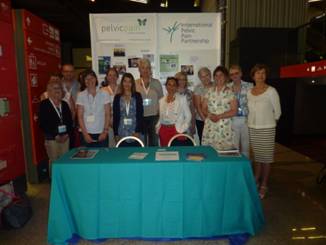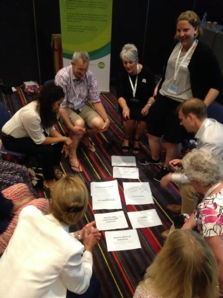Sex and chronicA health condition marked by long duration, by frequent recurrence over a long time, and often by slowly progressing seriousness. For example, rheumatoid arthritis. pelvic pain was one of the things people talked about, at a workshop to discuss which treatmentSomething done with the aim of improving health or relieving suffering. For example, medicines, surgery, psychological and physical therapies, diet and exercise changes. outcomesOutcomes are measures of health (for example quality of life, pain, blood sugar levels) that can be used to assess the effectiveness and safety of a treatment or other intervention (for example a drug, surgery, or exercise). In research, the outcomes considered most important are ‘primary outcomes’ and those considered less important are ‘secondary outcomes’. mattered to them. @sally_crowe tells the story.
Page last checked 30 January 2023

During a sultry June weekend in 2015, forty three people came together to talk about what matters to people living with chronic pelvic pain. I co-facilitated the workshop, which was taking place at the second World Congress on Abdominal and Chronic Pelvic Pain (CPP) in Nice, France. Of the 43 participants, 21 were women living with chronic pelvic pain (with different causes and conditions), 17 were health professionals and/or researchers, and helping with the practicalities were two volunteers from the UK Pelvic Pain Support Network. There were three observers from the workshop sponsor, Grunenthal. The workshop was the co-production of the International Pelvic Pain Partnership (details at the end of this blog) and enthusiastic clinician researchers from Edinburgh, Birmingham, South Tees and Oxford, and everyone was there in a voluntary capacity.
Agreeing what’s important
The aim of the workshop was to explore and discuss outcomes for day to day treatments for CPP, self management and research; including patient reported outcomes (PRO) and core outcome sets (COS). We worked in small and large groups, refining outcome areas and working towards prioritization of outcomes that both patients and health professionals/researchers could agree were important to measure in CPP treatment, care and research. The results of the discussion were framed in four categories of outcomes; high consensus, moderate consensus, some consensus and suggestions for new outcome areas.
The outcomes with high consensus were quality of life, psychological and fatigue. In the next category of moderate consensus and at number 7 was sexual activity, nestled in with social activities, pain and adverse effects of treatments. Reflecting on these results one is left with feeling that it is easy to make assumptions about what outcomes matter to people living with chronic conditions. Many readers may have assumed that pain would be a top outcome and that sexual activity could be considered a minor outcome, not so on both counts…..
Enabling ‘difficult’ discussions

What was also striking about the day was the relative ease with which participants talked about sex. An intention of the day was to create an atmosphere in the room that was relaxed, productive and respectful between participants, so that ‘difficult’ discussions could be had, and diverse opinions and experiences heard, and tolerated.
Groups were also encouraged to think about and discuss the wording of the outcomes under focus, and this generated some fascinating insights, not least around sex. Sexual activity and function (which seemed the common parlance in the professionals) quickly developed into broader definitions of sexual health, sexuality and intimacy, sexual relationships and sexual orientation. Fertility was discussed as a separate outcome. It was acknowledged that sex is a personal affair and what might be important for one person may not matter to others (cue much laughter!).
Eventually the group suggested a general rewording of ‘sexual activity’ to ‘sexuality and relationships’ to embrace the emotional and relational aspect of sex, and reduce the inference that sexual activity/function is a ‘mechanical’ process. It was astounding how much some participants were able to share about sex and chronic pelvic pain, and also heartening to see the respect accorded them in doing so. There was also much laughter in the room and whilst this seemed to help smooth the dialogue, it also highlighted the nervousness with which we approach talking about sex.
Let’s not sideline talk about sex
My work with other groups of people with chronic, life- long and life limiting conditions suggests that sex can be an important part of self identity, self worth and quality of life. Indeed in one of the very first James Lind Alliance research Priority Setting Partnerships in Schizophrenia the relationship between sex and side effects of anti psychotic drugs was number 4 in the top ten research priorities.
So let’s not sideline talk about sex, either in treatment, care or research. It is entirely possible and profitable to encourage discussion and debate that leads to better shared understandings that can inform health treatments, care and research.
All the blogs in our series on sexual problems can be found in the blog The problem with sex: a taboo that’s harming patients?
Please note, we cannot give specific medical advice and do not publish comments that link to individual pages requesting donations or to commercial sites, or appear to endorse commercial products. We welcome diverse views and encourage discussion but we ask that comments are respectful and reserve the right to not publish any we consider offensive. Cochrane UK does not fact check – or endorse – readers’ comments, including any treatments mentioned.
Disclosure statement: Sally Crowe reports other from Pelvic Pain Support Network, outside the submitted work.
Additional information
Crowe S, Birch J, Merriman J, Horne A, Daniels J, Hughes J, Meijlink J, Al-Abbadey M, Neustadt K. Report of a workshop: patient and professional perspectives of chronic pelvic pain. Workshop held as part of the Second World Congress on Abdominal and Pelvic Pain in Nice, France, 11th to 13th June, 2015. Available from: https://www.pelvicpain.org.uk/wp-content/uploads/2018/07/CPP-workshop-Report-Nice-2015-Sept-2015.pdf
Information about International Pelvic Pain Partnership
“The International Pelvic Pain Partnership is committed to substantially improving education, early and accurate diagnosis, effective treatment/management, and realistic prognosis for neuropathic chronic and visceral pelvic and perineal pain. We intend to increase the participation of the International Pelvic Pain Partnership in research and services development, so that these objectives are achieved in the next decade” For the IPPP it is all about expert patients talking and working with specialist clinicians.
Partner organizations include:
Pelvic Pain Support Network (UK), Netherlands Interstitial Cystitis Patients’ Organization, Vulval Pain Society (UK), Endometriosis AssociationA relationship between two characteristics, such that as one changes, the other changes in a predictable way. For example, statistics demonstrate that there is an association between smoking and lung cancer. In a positive association, one quantity increases as the other one increases (as with smoking and lung cancer). In a negative association, an increase in one quantity corresponds to a decrease in the other. Association does not necessarily mean that one thing causes the other. of Ireland, AFCI (Association Francaise de la Cystite Interstitielle), MICA (Multi- national IC Association), International Painful Bladder Foundation, Associazione Italiana Endometriosi, ACACi (Spain Interstitial Cystitis Association), AEAP-NP (Spanish Association for Pelvi-Perineal pain), Endometriosis Association Iceland, Endometriosis Association Norway, Endometriosis Association Netherlands, AICI (Italy Interstitial Cystitis Association)



Why is endometriosis sex painful, and how does it affects male partners?
People like having sex because it feels so good! Now, imagine wanting it so bad but your partner tells you “not today hun”… Why is endometriosis sex painful, and how does it affect your man?
Your man begins to question; is endometriosis sex painful, maybe you’re not in the mood today, maybe you don’t want him anymore, or is it him who hurts you?
The truth is, he doesn’t open up about what he feels because you have too much to deal with yourself.
After all, he’s not the one in pain. However, does it mean he’s not affected?
The emotional toll that comes along with loving a woman with endometriosis can be challenging at times, but when it comes to lack of sex, men can struggle.
There is a high rate of divorce amongst couples with endometriosis as opposed to those without this condition.
So, why is endometriosis sex painful?
Not only does penetration causes painful sex, but even orgasm through masturbation also has such a painful effect.
Painful sex (dyspareunia) is caused by factors such as stage or invasiveness of endometriosis, additionally, by indirect contributors like your bladder or pelvic floor dysfunction.
Regardless of the endometriosis stage, pelvic floor tenderness and painful bladder syndrome are associated with the severity of pain.
Endometriosis is associated with an increase in nerve bundle density. This causes tenderness and pain during sex. These nerve bundles are large, and by surrounding perineurium are easily identifiable.
It’s important to know that nerve bundle density is just one-factor causing pain.
There are also other physical factors, such as bladder tenderness, and psychological ones, like depression.
By asking why is endometriosis sex painful, you have to realize that it is a very complex subject.